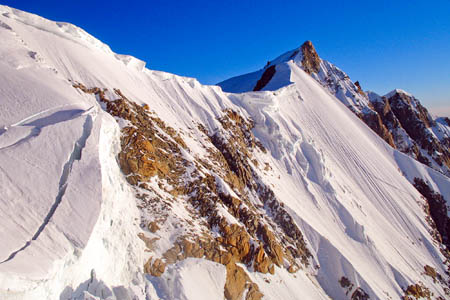Roger Payne, who died yesterday in an avalanche on Mont Maudit, was a leading voice in campaigns to increase access to land in both the UK and elsewhere, a Ramblers boss said.
Ramblers Scotland director Dave Morris described the Mountain Guide as an outstanding mountaineer.
The Ramblers said the world has lost an experienced and respected climber, mountain guide and outdoor enthusiast.
“The Ramblers express their deepest sympathy to the family and friends of Roger Payne, former general secretary of the British Mountaineering Council on hearing the news of his tragic death in an avalanche on Mont Maudit, in the Chamonix region of the French Alps,” a spokesperson said. “Our thoughts are with our friends at the BMC and also with the families of other climbers, and their families, during this very this difficult time.”
Mr Morris said: “The terrible loss of live in this tragic accident will sadden everyone and our thoughts are with all the friends and relatives.
“Roger Payne was an outstanding mountaineer whose contribution to the sport and the mountain environment was felt worldwide.
“As the general secretary of the British Mountaineering Council, then the sports and development director of the International Mountaineering and Climbing Association – the UIAA – and more recently as a professional mountain guide based in the Alps, he had a profound influence on the development of mountaineering, on fellow mountaineers and on the organisations and institutions who he sought to influence.
“Walkers and climbers who today enjoy rights of access to land both in the UK and elsewhere will remember the contribution that Roger made in his BMC and UIAA days to the efforts being made to secure such rights.
“Along with Alan Blackshaw, another British mountaineer and president of the UIAA, they were the leading voices who promoted the concept that a right to enjoy nature should be a fundamental human right for all citizens and be recognised as such by the United Nations.
“He was also deeply concerned about the life of mountain people and the role of mountains in the global environment.
“Various projects were driven forward by Roger to support sustainable development in mountain areas, to establish peace parks across international boundaries, especially in mountain areas affected by armed conflict, and to highlight the significance of global climate change and the melting of mountain glaciers.
“It is sadly ironic that a collapsing ice cliff and subsequent avalanche have now led to his death.
“In all this work he built strong links to other international organisations, notably the United Nations Environment Programme and the World Conservation Union.
“There was no other mountaineer who was held in such high regard at the senior levels of these organisations.”
Mr Morris said in recent times, from his base in Leysin in Switzerland, he spent much time in dialogue with the International Olympic Committee in Lausanne, promoting the walking and climbing agenda as an integral part of the objectives of the Olympic movement.
Part of that work highlighted the relationship between mountaineering and the Olympics in years gone by, including the awarding of Olympic medals to the 1922 British Mount Everest Expedition, and the realisation that a promise was made at that time to take a gold medal to the summit of Mount Everest.
He added: “I imagine Roger allowed himself a smile just a few weeks ago when that promise was finally delivered when fellow guide Kenton Cool was photographed by Keith Partridge on the summit, with the gold medal around his neck. A fitting contribution to the celebration of the London Olympics 2012 and it is good to know Roger had a part to play, behind the scenes.
“Roger was one of the most active mountaineers and skiers of his generation, from the Scottish Highlands to remote parts of the Himalaya.
“His enthusiasm and ability to stimulate and encourage others to get out and enjoy the outdoors was infectious.
“He was one of those few mountaineers who could combine active mountaineering with bureaucratic application. One day he would be battling the storms on an alpine peak, the next he would sit arguing the case for the mountains around a table of officials in yet another endless committee meeting.
“His patience and tolerance were immense, a perfect combination with his enthusiasm and determination to complete the climb or beat the bureaucrats.
“And in so much of what he did Roger’s wife, Julie-Ann Clyma was by his side, or on the other end of the rope.
“They established a partnership which flourished on mountains in all parts of the globe; a pair of guides who were known to so many who sought their company for an enjoyable mountain experience.
“Our thoughts are with Julie-Ann and family.
“Thanks for all you have done for the mountains, Roger, all the way towards your final summit.”
